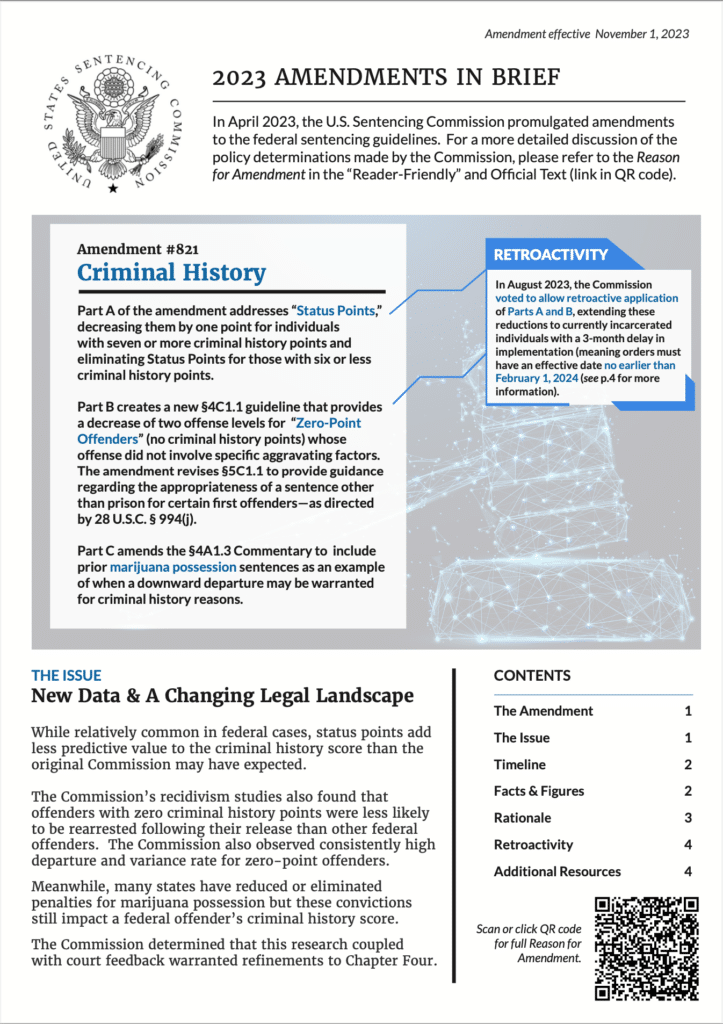Recent Amendments to the USSG Guidelines
The United States Sentencing Commission (USSG) has implemented pivotal changes to its Federal Sentencing Guidelines, effective November 1, 2023. These amendments reflect a commitment to the principles of the First Step Act, aiming to make sentencing fairer and more responsive to individual circumstances. Among the notable revisions are the expansion of the Compassionate Release policy, a broader Safety Valve provision, and a refined approach to Acceptance of Responsibility. Further, the amendments offer a progressive stance on Status Points and provide new avenues for downward departure, especially in light of past marijuana possession convictions. This overview will explore the amendments in detail, delving into their implications for the justice system and those it serves.
Detailed Amendments to the USSG Guidelines
USSG § 1B1.13 – Compassionate Release
The Compassionate Release policy statement has been revised to be consistent with the First Step Act, now permitting defendants to initiate a motion for Compassionate Release. The amendment widens the scope of ‘extraordinary and compelling reasons’ that may justify such a release. Notably, it introduces categories for ‘unusually long sentences’ and instances of ‘victim abuse,’ providing a more humane approach to sentencing.
USSG § 5C1.2 – Safety Valve Provision
The Safety Valve guideline, which permits certain offenders to avoid mandatory minimum sentences, has been broadened. More defendants now qualify for this relief due to a relaxation of the criminal history requirements, specifically for Level II cases. This change signifies a shift towards individualized assessments and away from strictly punitive measures.
USSG § 3E1.1 – Acceptance of Responsibility
This provision has been updated to articulate what constitutes ‘preparing for trial,’ now defined as substantive preparations to present the government’s case to a jury or judge. This clarification assists defendants in understanding the actions that may impact their eligibility for sentencing reductions under this guideline.
USSG § 4A1.1 – Status Points
Status Points, which contribute to determining the severity of criminal history, have been recalibrated. A reduction by one point is now accorded to defendants with seven or more criminal history points. Importantly, the points are entirely eliminated for those with six or fewer points. This change, effective retroactively from February 1, 2024, could significantly impact ongoing and future sentencing.
New USSG § 4C1.1 – Decrease for Zero-Point Offenders
A new guideline has been introduced, offering a two-level decrease for offenders who have zero criminal history points and whose offenses do not involve specific aggravating factors. This provision is also retroactive from February 1, 2024, and represents a substantial shift towards recognizing the potential for rehabilitation in first-time, non-violent offenders.
USSG § 5C.1.1 – Guidance for First Offenders
The USSG has amended this guideline to provide explicit guidance regarding the sentencing of first offenders, emphasizing the appropriateness of non-prison sentences. This amendment supports alternatives to incarceration, reflecting a growing recognition of the benefits of rehabilitation and reintegration programs.
USSG § 4A1.3 – Prior Marijuana Possession Sentences
In an acknowledgment of changing societal views on marijuana, USSG § 4A1.3 is amended to consider previous marijuana possession convictions as a potential basis for downward departure. This aligns the sentencing guidelines with evolving legal and social perspectives on drug-related offenses.
These comprehensive changes to the USSG Guidelines mark a significant move towards a more nuanced and humane sentencing system. The amendments address longstanding concerns about the rigidity of the federal sentencing framework and offer a path to more equitable treatment under the law.
As we conclude our overview of the 2023 USSG Guidelines amendments, we invite you to consider the profound implications these changes may have on sentencing outcomes. With the expansion of the Compassionate Release and Safety Valve provisions, and the recalibration of Status Points, the path to fairer sentencing is clearer. If these adjustments could impact your situation, or if you require guidance through the revised legal landscape, we urge you to reach out to our seasoned attorneys today. Our expertise can provide clarity and support in leveraging these reforms to your advantage.


